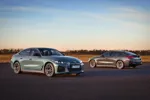Globally, Mercedes-Benz Vans celebrated record unit sales last year; in the UK, it was a different matter. The dip in registrations was slight – less than 3% - but in a market up 21%, its share wilted from 7.57% to 6.09% and the company dropped from fourth to seventh.
The big hit occurred in the final month of the year. Until that point, unit sales were tracking up year-on-year.
However, far from painting a gloomy picture, Mercedes-Benz Vans head of fleet Calum James (pictured), insists the performance was in line with expectations as the business started to wash through its entire range of vans. By the end of this year, all three van models will have been refreshed, and all will come with an electric option.
“Supply and availability have been an issue but it’s returning, and we are in a healthy position,” James said.
Those green shoots have already sprouted in the first quarter of 2024, with Mercedes-Benz Vans mirroring the overall market growth with an 8.47% rise in registrations and a 6.21% share.
James added: “Things have changed post pandemic, and we want to focus on our long-term partnerships. We hit our targets last year, but the future is about maintaining a natural growth rate.”
The implication is the market will not be forced; registrations will come from natural demand and not short-term kneejerk reactions to month-by-month sales fluctuations.
A key pillar to this strategy is to simplify business activities with key customers by better understanding their priorities and challenges while preserving an open and transparent relationship.
“They are in a challenging environment with high cost of funds and energy, the Government policy on the ZEV Mandate – they have a lot to balance,” said James.
“We have tasked our field team with getting closer to customers.”
To elevate the knowledge base, Mercedes-Benz Vans (MBV) has commissioned a survey of 2,500 business owners and van drivers to identify their concerns. One clear outcome was their focus on electrification and sustainability.
“Their challenge is getting those vehicles to work. Even before you get into network infrastructure and planning, there is the recharging issues when vans go home,” James said.
MBV is supporting customers via a partnership with GreenJam for workplace infrastructure, and well as offering a £1,000 contribution to public charging via RightCharge. Its desire to assist is underpinned by a product line-up that will this year feature the eCitan, eVito and eSprinter.
“There is a lot of interest in making the transition; most aren’t shifting their objectives,” James said. “They are still committed but they do face challenges.”
Is he concerned about the ZEV Mandate targets, which came into force this year and require manufacturers to ensure 10% of their van registrations are zero emission?
“With the new models and the ramp up of eSprinter in Q2, we have the product,” he said. “I have the number in my head!”
MBV is working with customers on their transition plans to ensure its production volumes correspond with their ambitions. It has flexibility on the numbers, but it is also careful not to over-commit.
“It’s about understanding customers and their cycle changes and transition plans. Data gathering with customers has been a key focus,” James said.
The new eSprinter, offered with a 4.25-tonne option, has heralded a number of fleet-focused initiatives, including the introduction of an integrated service package which offers to cover the cost of four services. These services can be redeemed annually or every 40,000km, whichever comes first.
Also available as standard on the eCitan, the service offer remains with the vehicle if it changes ownership within the four-year period.
Mercedes-Benz Vans is also piloting a premium concierge service with priority workshop booking to minimise downtime. If successful, it will be rolled out to the rest of the electric van range.
“It means there is a strong reason for the vehicle to come into the dealership because of the priority booking,” James said. “There is a strong total cost of ownership and uptime message.”
In addition, every eSprinter leaving the workshop is guaranteed to have at least 30% charge. With WLTP range of 271 miles, this gives the driver a minimum of 80 miles to get to their next destination.
All dealer sales staff have undergone two weeks of training to ensure they have the necessary knowledge to advise customers about their electric journey. A number of key account customers will be offered the same training.
MBV is also looking at technician capability and skills set, including its roadside assistance service, to ensure vehicles can be fixed quickly and efficiently. Over-the-air software updates will further help to improve uptime.
More than 90% of roadside technicians hold an EV qualification that allows them to safely assess and deal with EVs at the roadside, while 40% of Mercedes-Benz workshop technicians hold diagnostic-level EV qualifications.
The next step is to train those technicians to level 4, which will enable them to repair to component level, high voltage systems.
“We are ahead of plan and have commitment from dealers to invest in their facilities, equipment and technicians,” James said. “We are also parts matching in peak periods using data and insights.
“It’s about having the right parts in the right place at the right time.”
As well as offering assurances on aftersales services, James is also working with contract hire and leasing companies to give them confidence about residual values. A key part of this is the eight-year battery warranty.
James believes the electric range gives Mercedes-Benz Vans a big opportunity to win business, particularly in traffic management as local authorities begin mandating electric. Mid-term rental offers another route to market which will help fleets to take their first cautious steps into electrification.
MBV will also adhere to the General Safety Requirements 2 (GSR2) legislation being introduced in Europe this year which sets minimum safety standards for vehicles, with implications for functional safety of connected features such as Advanced Driver Safety Systems (ADAS).
“We will implement it in the UK because safety and security are paramount for us,” James said.
Connectivity is opening up data services for leasing and fleet management companies, with MBV offering the information via an API.
The Mercedes Pro connectivity hub merged with the Mercedes Me app in 2021, and the manufacturer is now starting to engage fleet customers with the wealth of connected services this offers.
“We have common technology sharing from car to van, such as the MBUX telematics and multimedia system,” James said. “This is being brought in more and more.”
Inevitably, higher levels of technology and greater investment in product comes at a higher price, which coincides with the high cost of funds and rising energy prices. It is, concedes James, “a perfect storm”.
He added: “Everyone has their part to play to support the customer, and future planning is also important. We have to be as close to the customer as possible, and easy to do business with, by removing barriers and informing them about the future and where we are going as a brand.”





















Login to comment
Comments
No comments have been made yet.